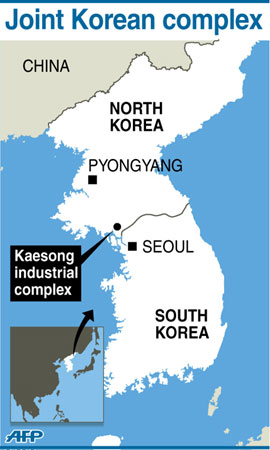Koreas agree to hold talks on joint zone

Graphic showing Kaesong industrial estate, a joint North-South Korean complex which officials said Thursday was operating normally despite Pyongyang severing a military hotline used to monitor movement in and out of the zone. AFP
SEOUL — North and South Korea agreed Thursday to hold talks about reopening a joint industrial zone which shut down amid high military tensions.
The agreement follows months of friction and threats of war by Pyongyang, after its February nuclear test attracted tougher UN sanctions.
Thursday’s announcement came a day after the North restored a cross-border hotline and announced it would let the South’s businessmen visit the Kaesong estate just north of the border to check on their closed factories.
The South’s unification ministry responded by suggesting a working-level meeting at the border truce village of Panmunjom on Saturday.
After some dispute about the venue, the North accepted the South’s proposal, a ministry spokesman told AFP.
Article continues after this advertisementPlans for high-level talks last month on the future of the estate, which has been shut since April, had collapsed at the last minute due to a protocol dispute.
Article continues after this advertisementThe Kaesong estate, where 53,000 North Koreans worked in 123 Seoul-owned factories, is the last remaining symbol of cross-border reconciliation and a valuable source of hard currency for the impoverished North.
It was the most high-profile casualty of the months of elevated tensions that followed the North’s nuclear test, the subsequent tightened UN sanctions and US-South Korean military exercises.
After repeatedly threatening Seoul and Washington with conventional and nuclear attack, Pyongyang in recent weeks appears to want to shift to dialogue.
Professor Kim Yong-Hyun of Seoul’s Dongguk University had said earlier the North was likely to respond positively to the talks proposal, as it tries to improve its people’s living standards and attract foreign investment to special economic zones elsewhere.
Pyongyang is also mindful of a US demand that it improve ties with Seoul before any talks with Washington, said Professor Koh Yu-Hwan of the same university.
After last month’s fence-mending meeting with Seoul failed to go ahead, Pyongyang proposed direct, high-level dialogue with Washington.
In an apparent bid to press it to talk, the North this week allowed a pro-Pyongyang paper to release a video and interview with an American sentenced to hard labour for alleged subversion.
Kenneth Bae called on the United States to secure his early release, saying he has been in poor health since he was sent to prison in May to start a 15-year sentence.
“North Korea is seeking to exploit people’s sympathetic feelings for Bae to compel the United States to have talks with it,” Koh told AFP.
“It wants to shift to dialogue from confrontation. However, unless the North takes concrete steps to meet its international obligations, it is hardly likely to nudge the United States toward the dialogue table.”
North Korea has vowed never to give up its nuclear weapons, but says it is open to direct talks with the United States.
But the United States and South Korea say the North must take actions first to prove its commitment to abandoning its nuclear programme.
The North’s first vice foreign minister Kim Kye-Gwan is currently on a visit to Moscow to discuss possible resumption of six-party nuclear talks stalled since December 2008.
Kim late last month discussed restarting the talks in Beijing, where he met China’s Foreign Minister Wang Yi.
Operations at Kaesong just north of the heavily fortified border came to a halt after the North banned entry by the South’s factory managers and other officials and pulled all its own workers out in April.
Its concessions on Wednesday came hours after dozens of South Korean firms threatened to withdraw altogether from the zone, complaining they had fallen victim to political bickering between the two rivals.
Representatives of the South Korean companies have repeatedly urged the two sides to open talks to revive the moribund industrial park.
Of them, 46 are manufacturers of electronics and machinery parts whose facilities are especially vulnerable to humidity in the current weather.